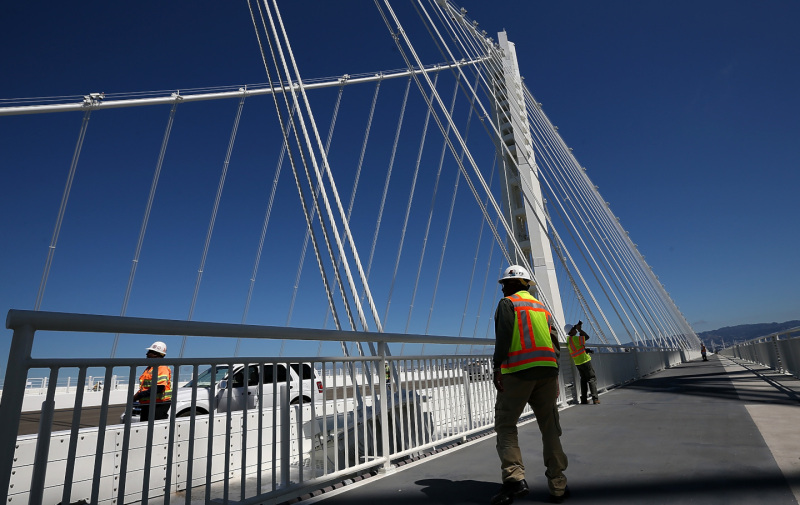The infrastructure package, which Biden called a “blue-collar blueprint to rebuilding America,” is a historic investment by any measure, the breadth of which he compared to the building of the interstate highway system over the last century, or the transcontinental railroad the century before that.
Yet despite the win, Democrats were dealt a major setback when they were forced to postpone a vote on a second, even larger bill until later this month. That 10-year, $1.85 trillion measure, bolstering health, family and climate change programs — which Biden refers to as “human infrastructure” — was sidetracked after Democratic moderates demanded a cost estimate on the measure from the nonpartisan Congressional Budget Office. The postponement dashed hopes that the day would produce a double-barreled win for Biden with passage of both bills.
Notwithstanding those setbacks, California officials are still hailing the historic investment in local transit and highways.
Modernizing California’s infrastructure
Gov. Gavin Newsom issued a statement Saturday lauding the House’s passage of the bill, saying it will help create quality jobs for Californians and support the modernization of state infrastructure.
“The infrastructure package passed by Congress builds on California’s unprecedented investments to maintain and modernize the state,” he said. “This historic infrastructure package stands to accelerate investments in our clean transportation infrastructure, help mitigate some of the worst impacts of climate change and accelerate new projects that will create thousands of jobs.”
The Bay Area’s Metropolitan Transportation Commission Chair Alfredo Pedroza, who is also a Napa County supervisor, said the infrastructure package will help fund long-term regional plans to revamp transportation and housing.
“Not only will the big increase in transit capital funding help modernize our existing transit network to serve a new generation of customers but expansion of the discretionary grant programs will allow the Bay Area to compete for money that can move big new projects from the plan to reality,” he said in a statement.
According to the governor’s office, California expects to receive:
- Federal-aid highway apportioned programs: $25.3 billion, with $4.2 billion for bridge replacement and repairs. California has 1,536 bridges and more than 14,000 miles of highway in poor condition, according to the governor’s office. California commute times have increased by 14.6% in the state, with drivers paying nearly $800 a month due to driving on roads needing repair. The governor’s office said this investment will be the “single-largest dedicated bridge investment” in California since the construction of the interstate highway system. Exactly which bridges would net that funding is still an open question: The MTC said they would “compete for funds” in the multibillion-dollar set-aside.
- Improved public transportation: $9.45 billion. That may aid many people of color across the state: Non-white households are 1.6 times more likely to commute via public transit in California, according to the governor’s office. And in California, 16% of transit vehicles are past their useful lives, but still in use. Still, the amount may not make a dent in overall transit needs in the Bay Area — Muni’s parent agency, the San Francisco Municipal Transportation Agency, has more than $3 billion worth of needs identified for a five-year period through 2023, and more than $30 billion in infrastructure needs over the next 20 years. The Bay Area is host to 27 transit agencies.
- Expansion of an EV charging network: $384 million, and the opportunity to apply for the $2.5 billion in grant funding dedicated to EV charging. The investment is part of Biden’s effort to boost plug-in electric vehicle sales by building out a “first-ever national network of EV chargers” in the U.S., according to a statement from the White House.
- Broadband coverage across the state: $100 million. About 545,000 Californians don’t have access to broadband internet, and under the new infrastructure bill, some 10 million Californians in lower-income households will be eligible for a benefit to afford internet access. In July, California lawmakers passed a $6 billion investment to expand broadband coverage, including building out new high-speed fiber lines, connecting rural homes to internet access, and creating a new broadband lead position in the state’s Department of Technology.
- Protection against wildfires: $84 million. Californians are no strangers to wildfire’s devastating impacts, which have displaced residents from Paradise to Tahoe and beyond, costing the state an estimated $50 billion to $100 billion in damages, according to the White House. Newsom’s investment strategy also includes $2 billion toward the purchase of new firefighting equipment like air tankers and helicopters, as well as supporting forest and wildfire resilience strategies across the state. Still, Newsom’s recent budgets have pledged hundreds of millions less toward wildfire prevention than what he had initially proposed. NPR’s California Newsroom recently published an investigation — led by CapRadio — reporting that the governor has overstated, by 690%, the number of acres treated with fuel breaks and prescribed burns in projects he said needed to be prioritized.
- Improvements to water infrastructure and clean drinking water: $3.5 billion. That investment includes funding toward water recycling and ecosystem restoration in California (like the Bay Area’s wetlands), according to the MTC.
- Infrastructure development for airports: $1.5 billion.
This post includes reporting from Bay City News, The Associated Press, NPR’s Barbara Sprunt and KQED’s Cesar Saldaña, Joe Fitzgerald Rodriguez and Lakshmi Sarah.

